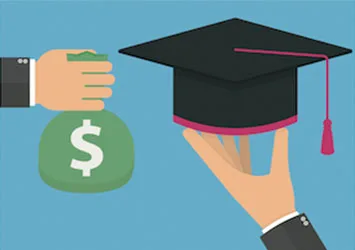We’re reader-supported and may be paid when you visit links to partner sites. We don’t compare all products in the market, but we’re working on it!
How to manage your debt
Learning how to manage your debt earlier in life can put you in good stead for managing your finances in the future. And no matter what form it comes in, there are plenty of ways to deal with debt. So whether you’ve maxed out your credit card, need to repay your car loan or mortgage or want to get a start on your student debt, use this guide for the tips and strategies you need to get your finances in control.
What type of debt are you trying to repay?
Depending on what type of debt you have, there are different strategies to deal with it. Compare the steps for consolidating and managing different types of debt below.

Credit card
If you’re struggling to repay a high-interest debt, there are a few strategies you can employ to pay it down. For example, you can create a payment plan and pay more than the minimum repayment each month to cut down your debt faster. Otherwise, if you’re struggling with your debt because of high-interest rates, you can use a 0% balance transfer credit card to move your debt to a card with an interest-free offer for a promotional period. A balance transfer can also come in handy if you have multiple debts that you’d like to consolidate on one card.
‘How to’ guides to help you manage your credit card debt

Car loan
If you need a new set of wheels but don’t have the cash to pay for it upfront, a car loan can be a convenient way to free up your cash flow and purchase a car. However, there are interest rates and loan terms involved, so you should create a repayment plan to ensure you can clear your debt and cut down your interest costs.
‘How to’ guides to help refinance a car loan
Student loan
Whether you’re at TAFE or university, it’s likely that a student loan is one way you’re considering finance your education. However, while HECs debt might seem like something you’ll have to deal with in the far future, chipping away at it early can help you in the long run. Use our student debt guide to discover the types of loans available and the refinancing alternatives you can consider when you start to pay it off.
If you’re struggling to repay smaller costs such as textbooks, laptops or other studying supplies, you could also consider a student credit card or personal loan to build your credit history and free up your cash.
‘How to’ guides to help repay your student loans
Personal loan
If you’re in need of a line of credit but aren’t eligible for a credit card, a personal loan is another alternative. Whether you want a short-term loan to free up your cash between paydays or an installment loan to make repayments over a longer predetermined loan term, you can compare your options to find a loan that’ll suit your financial situation and ability to repay. Even if you have limited or bad credit, some cash loan providers don’t require applicants to have a good credit history to apply. See our related guides below for tips on how to compare personal loans and strategies you can use to repay them on time.
‘How to’ guides to help repay your personal loan
Home loan
Buying your first home is an exciting time, but it can also burn a hole in your pocket if you don’t compare and weigh up your financing options. Whether you’re buying your first property or looking to invest, use the guides below to compare your home loan options, learn how to refinance your mortgage and pick up tips to buy your first home early and repay it within 10 years.
'How to' guides to help you buy your first home









